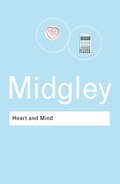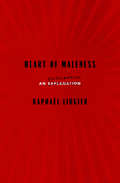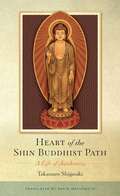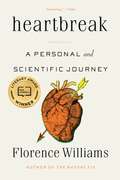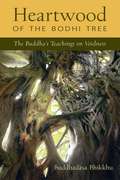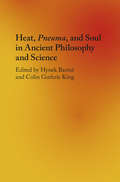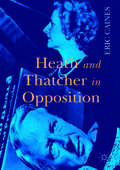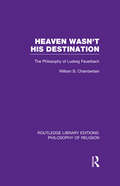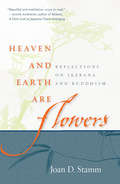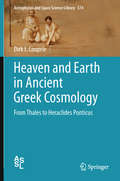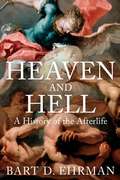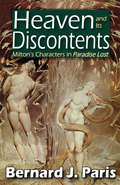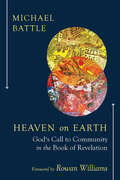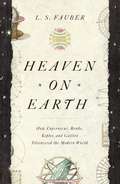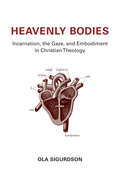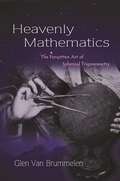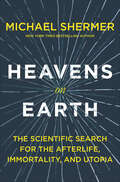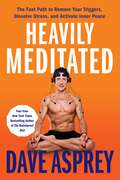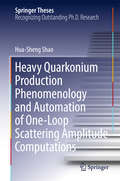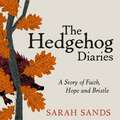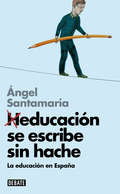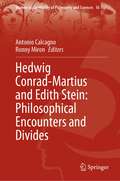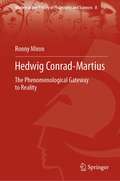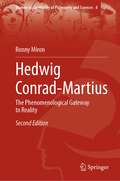- Table View
- List View
Heart and Mind: The Varieties of Moral Experience (Routledge Classics)
by Mary MidgleyWith a new introduction by the author. It is a book of superb spirit and style, more entertaining than a work of philosophy has any right to be.’ – Times Literary Supplement. Throughout our lives we are making moral choices. Some decisions simply direct our everyday comings and goings; others affect our individual destinies. How do we make those choices? Where does our sense of right and wrong come from, and how can we make more informed decisions? In clear, entertaining prose Mary Midgley takes us to the heart of the matter: the human experience that is central to all decision-making. First published: 1983.
Heart of Maleness: An Exploration
by Raphaël LiogierIn this timely, self-reflective essay, a groundbreaking sociologist and philosopher examines the underlying causes of gender inequality and how we can fight against it.Following the shocking, infuriating accounts shared as part of the #MeToo movement, Raphaël Liogier felt compelled to apply his academic expertise to shed light on the roots of gender inequality and its many manifestations, including catcalling, workplace harassment, and rape, as well as the glass ceiling and the gender pay gap. In the brazenness of Donald Trump, who brags about groping women, in the hypocrisy of outspoken progressives whose private behavior belies their so-called feminist ideals, and even occasionally in the good intentions of men such as Liogier who strive to be allies, we can see the influence of a deep-seated fantasy of male dominance.With candor and clarity, Liogier demonstrates that the archetypal Prince Charming and a monstrous predator such as Harvey Weinstein are two sides of the same coin—products of a worldview that not only places a man's desires above a woman's, but also doubts whether women are fundamentally capable of knowing what they want. Recent years have witnessed significant progress toward gender equality, from the ousting of prominent men accused of sexual misconduct to the unprecedented popularity of the 2019 Women's World Cup. Heart of Maleness maps out the crucial work still to be done, first and foremost addressing the core male fantasy about women's bodies and minds.
Heart of the Shin Buddhist Path
by David Matsumoto Takamaro ShigarakiIn his Heart of the Shin Buddhist Path, Takamaro Shigaraki examines Shin Buddhism anew as a practical path of spiritual growth and self-transformation, challenging assessments of the tradition as a passive religion of mere faith. Shigaraki presents the core themes of the Shin Buddhist path in fresh, engaging, down-to-earth language, considering each frankly from both secular and religious perspectives. Shigaraki discloses a nondual Pure Land that finds philosophical kinship with Zen but has been little discussed in the West. With its unassuming language and insights drawn from a life of practice, Heart of the Shin Buddhist Path dispels the fog of misconception that has shrouded Western appreciation of Shin traditions to reveal the limitless light of Amida Buddha that reaches all.
Heartbreak: A Personal and Scientific Journey
by Florence WilliamsWinner of the 2023 PEN/E.O. Wilson Literary Science Writing Award A Five Books "Best Literary Science Writing" Book of 2023 • A Smithsonian Best Science Book of 2022 • A Prospect Magazine Top Memoir of 2022 • A KCRW Life Examined Best Book of 2022 "Keen observer [and] deft writer" (David Quammen) Florence Williams explores the fascinating, cutting-edge science of heartbreak while seeking creative ways to mend her own. When her twenty-five-year marriage suddenly falls apart, journalist Florence Williams expects the loss to hurt. But when she starts feeling physically sick, losing weight and sleep, she sets out in pursuit of rational explanation. She travels to the frontiers of the science of "social pain" to learn why heartbreak hurts so much—and why so much of the conventional wisdom about it is wrong. Soon Williams finds herself on a surprising path that leads her from neurogenomic research laboratories to trying MDMA in a Portland therapist’s living room, from divorce workshops to the mountains and rivers that restore her. She tests her blood for genetic markers of grief, undergoes electrical shocks while looking at pictures of her ex, and discovers that our immune cells listen to loneliness. Searching for insight as well as personal strategies to game her way back to health, she seeks out new relationships and ventures into the wilderness in search of an extraordinary antidote: awe. With warmth, daring, wit, and candor, Williams offers a gripping account of grief and healing. Heartbreak is a remarkable merging of science and self-discovery that will change the way we think about loneliness, health, and what it means to fall in and out of love.
Heartwood of the Bodhi Tree
by Ajahn Buddhadasa Bhikkhu Santikaro DhammavicayoClear and simple teachings on voidness and living an ethical life.In Heartwood of the Bodhi Tree, Buddhadasa Bhikkhu presents in simple language the philosophy of voidness, or sunnata, that lies at the heart of the Buddhism. By carefully tying voidness to ethical discipline, Buddhadasa provides us clear and open grounds to reflect on the place of the philosophy in our lives. With his ecumenical, stimulating, and enthusiastically engaged approach to reading the Buddha's teaching in full flourish, Ajahn Buddhadasa transforms the jungle of philosophy into a glade as inviting as the one in which he famously taught.
Heat, Pneuma, and Soul in Ancient Philosophy and Science
by Hynek Bartoš Colin Guthrie KingThe conceptualization of the vital force of living beings as a kind of breath and heat is at least as old as Homer. The assumptions that life and living things were somehow causally related to 'heat' and 'breath' (pneuma) would go on to inform much of ancient medicine and philosophy. This is the first volume to consider the relationship of the notions of heat, breath (pneuma), and soul in ancient Greek philosophy and science from the Presocratics to Aristotle. Bringing together specialists both on early Greek philosophy and on Aristotle, it brings an approach drawn from the history of science to the study of both fields. The chapters give fresh and detailed interpretations of the theory of soul in Heraclitus, Empedocles, Parmenides, Diogenes of Appolonia, and Democritus, as well as in the Hippocratic Corpus, Plato's Timaeus, and various works of Aristotle.
Heath and Thatcher in Opposition
by Eric CainesThis book traces how Edward Heath and Margaret Thatcher, during their respective years as Conservative Opposition Leaders (1965-70 and 1975-79), managed their Party's attempts to ensure a return to government, each after two electoral defeats. They did so in the context of an emergent New Conservatism, championed by the likes of Enoch Powell, Keith Joseph and Nigel Lawson, which betokened a long-term change from the post-war Butskellite settlement. Against a national background of declining economic status, high inflation, debilitating public sector strikes and internal Conservative Party debates, particularly over industrial relations policy and monetarism, they adopted strikingly different approaches to policy-making in Opposition. The book illustrates how, paradoxically, Heath's technocratic over-prescription failed to save his eventual premiership, while Thatcher's under-committed policy design failed to impede her leading a purposeful and transformative government in the 1980s.
Heaven Wasn't His Destination: The Philosophy of Ludwig Feuerbach (Routledge Library Editions: Philosophy of Religion)
by William B. ChamberlainIf forced to state Feuerbach’s philosophical genealogy, one would have to say that he was son of Hegel, father of Marx, and half-brother of Comte. In his own day he had many a celebratory and many a vilifier. His philosophy has received very little direct treatment in the English language. Feuerbach’s contribution was in his writings on religion and philosophy, each of them a manifesto to humanity, telling us that the desires of men can be satisfied here below. The object of this book, first published in 1941, is twofold. It is its intention to pay humble tribute to a little understood philosopher whose stature grows with the years, and in so doing perhaps to provide a key to the question of religion and personal immortality for those who reject philosophical idealism and a personal God.
Heaven and Earth Are Flowers
by Joan D. StammIn this lovely meditation on ikebana - the Japanese art of flower arranging - Joan Stamm shows us how her twin paths of Buddhist practice and artistic endeavor converge and indeed become thoroughly intertwined. Stamm's lush, elegant voice weaves childhood memories of her mother's joy at a just-bloomed morning glory with meditations on the symbolic importance of bamboo, of pine, of the lily. She takes us with her on her travels to Japan as she learns the essential principles of ikebana, and lets us join her as she teaches flower arranging to women in a nursing home who, though they won't recall tomorrow the rules of arrangement or even the flowers' names, nonetheless partake in the joy and love that celebrates all living things, however briefly they endure. And, when Joan shows us the natural symmetry of a blossom, we find that we too have regained our balance. Includes 16 full-color photographs of the author's original ikebana.
Heaven and Earth Are Not Humane: The Problem of Evil in Classical Chinese Philosophy (World Philosophies)
by Franklin PerkinsThat bad things happen to good people was as true in early China as it is today. Franklin Perkins uses this observation as the thread by which to trace the effort by Chinese thinkers of the Warring States Period (c.475-221 BCE), a time of great conflict and division, to seek reconciliation between humankind and the world. Perkins provides rich new readings of classical Chinese texts and reflects on their significance for Western philosophical discourse.
Heaven and Earth in Ancient Greek Cosmology
by Dirk L. CouprieIn Miletus, about 550 B.C., together with our world-picture cosmology was born. This book tells the story. In Part One the reader is introduced in the archaic world-picture of a flat earth with the cupola of the celestial vault onto which the celestial bodies are attached. One of the subjects treated in that context is the riddle of the tilted celestial axis. This part also contains an extensive chapter on archaic astronomical instruments. Part Two shows how Anaximander (610-547 B.C.) blew up this archaic world-picture and replaced it by a new one that is essentially still ours. He taught that the celestial bodies orbit at different distances and that the earth floats unsupported in space. This makes him the founding father of cosmology. Part Three discusses topics that completed the new picture described by Anaximander. Special attention is paid to the confrontation between Anaxagoras and Aristotle on the question whether the earth is flat or spherical, and on the battle between Aristotle and Heraclides Ponticus on the question whether the universe is finite or infinite.
Heaven and Hell: A History of the Afterlife
by Bart D. EhrmanWhether we believe in them or not, we are all familiar with the concepts of heaven and hell. There was a time, however, when no one thought they would go to either of these places after they died. In fact, Jesus didn&’t believe a dead person&’s soul was bound for heaven or hell, and these ideas are nowhere to be found in the Old Testament. So, where did they come from? From the Epic of Gilgamesh to the writings of Augustine, Bart Ehrman provides a fascinating and thought-provoking history of the afterlife. He traces how beliefs changed over time and reveals the social, cultural and historical roots of competing views held by Greeks, Jews and Christians. Ultimately, he shows that many of our ideas about heaven and hell emerged long after Jesus&’s time, through the struggle to explain the injustices of our world.
Heaven and Its Discontents: Milton's Characters in Paradise Lost
by Bernard J. ParisMany critics agree with C. S. Lewis that "Satan is the best drawn of Milton's characters". Satan is certainly a wonderful creation, but Adam and Eve are also complex and well-drawn, and God may be the most complicated character of all. Paradise Lost is above all God's story; it is his discontent, first with Lucifer and then with human beings, that drives the action from the beginning until his anger subsides at the world's end. God and Satan have similarities not only in their pursuit of revenge, but also in their craving for power and glory. The ambitious Satan wants more than he already has, but what accounts for the voracity of God's appetite? Does the fact that each threatens the status of the other help to explain the intensity of their hatred and rage? Is their vindictiveness a response to being threatened, an effort to repair the injury they feel they've sustained? This seems to be the case for Satan, but must not God also have felt deeply hurt to have such a powerful need for vengeance? If so, why is the Almighty so vulnerable? And why is he so hard on Adam and Eve and the rest of humankind? These are the kinds of questions Bernard Paris tries to answer in this book. Paris's purpose is not to focus on Milton's illustrative intentions but to try to understand God, Satan, Adam, and Eve as psychologically motivated characters who are torn by inner conflicts.Most critics treat Milton's characters as coded messages from the author, but their mimetic features interfere with the process of decoding. Instead of looking through the characters to the author, Paris looks at Milton's characters as objects of interest in themselves, as creations inside a creation who escape their thematic roles and are embodiments of his psychological intuitions. This book heightens our appreciation of an ignored aspect of Milton's art and offers new insights into the critical controversies that have surrounded Paradise Lost.
Heaven on Earth: God's Call To Community In The Book Of Revelation
by Michael BattleMuch of the literature on the book of Revelation paints a frightening apocalyptic vision of the end times. Michael Battle offers an alternative look at Revelation in this new work, seeing it instead as a hopeful call to bring heaven on earth. Battle explores the problematic imagery found in Revelation before showing how similar problems play out in our contemporary world. Battle sees Revelation as a guide that shows us that we can live out God's call for heaven on earth by living in community with one another, as exhibited through the writings of Martin Luther King Jr., Desmond Tutu, Rowan Williams, and Ubuntu theology. He writes, "I seek to imagine in my particular Christian context how a view of heaven need not lead to culture wars and further excuses for oppressing others. Heaven, as envisioned by John of Patmos, has much greater purpose."
Heaven on Earth: How Copernicus, Brahe, Kepler, and Galileo Discovered the Modern World
by J. S. Fauber'What Fauber does well is humanize these four residents of the pantheon of science... The story is seldom less than fascinating. A readable, enjoyable contribution to the history of science.' - KirkusAn intimate examination of a scientific family - that of Nicolaus Copernicus, Tycho Brahe, Johannes Kepler and Galileo Galilei. Fauber juxtaposes their scientific work with insight into their personal lives and political considerations, which shaped their pursuit of knowledge. Uniquely, he shows how their intergenerational collaboration made the scientific revolution possible.These brave scientists called each other 'brothers', 'fathers' and 'sons', and laid the foundations of modern science through familial co-work. And though the sixteenth century was far from an open society for women, there were female pioneers in this 'family' as well, including Brahe's sister Sophie, Kepler's mother, and Galileo's daughter. Filled with rich characters and sweeping historical scope, this book reveals how the strong connections between these pillars of intellectual history moved science forward.
Heavenly Bodies: Incarnation, the Gaze, and Embodiment in Christian Theology
by Ola SigurdsonDeep and wide study of 2,000 years of Christian thought on the human body Does Christianity scorn our bodies? Friedrich Nietzsche thought so, and many others since him have thought the same. Ola Sigurdson contends, to the contrary, that Christianity — understood properly — in fact affirms human embodiment. Presenting his constructive contributions to theology in relation to both historical and contemporary conceptions of the body, Sigurdson begins by investigating the anthropological implications of the doctrine of the incarnation. He then delves into the concept of the gaze and discusses a specifically Christian "gaze of faith" that focuses on God embodied in Jesus. Finally, he weaves these strands into a contemporary Christian theology of embodiment. Sigurdson's profound engagement with the whole history of Christian life and thought not only elucidates the spectrum of Christian perspectives on the body but also models a way of thinking historically and systematically that other theologians will find stimulating and challenging.
Heavenly Mathematics: The Forgotten Art of Spherical Trigonometry
by Glen Van BrummelenAn unparalleled illustrated history of spherical trigonometry from antiquity to todayHeavenly Mathematics traces the rich history of spherical trigonometry, revealing how the cultures of classical Greece, medieval Islam, and the modern West used this forgotten art to chart the heavens and the Earth. Once at the heart of astronomy and ocean-going navigation for two millennia, the discipline was also a mainstay of mathematics education for centuries and taught widely until the 1950s. Glen Van Brummelen explores this exquisite branch of mathematics and its role in ancient astronomy, geography, and cartography; Islamic religious rituals; celestial navigation; polyhedra; stereographic projection; and more. He conveys the sheer beauty of spherical trigonometry, providing readers with a new appreciation of its elegant proofs and often surprising conclusions. Heavenly Mathematics is illustrated throughout with stunning historical images and informative drawings and diagrams. This unique compendium also features easy-to-use appendixes as well as exercises that originally appeared in textbooks from the eighteenth to the early twentieth centuries.
Heavens on Earth: The Scientific Search for the Afterlife, Immortality, and Utopia
by Michael ShermerA scientific exploration into humanity’s obsession with the afterlife and quest for immortality from the bestselling author and skeptic Michael ShermerIn his most ambitious work yet, Shermer sets out to discover what drives humans’ belief in life after death, focusing on recent scientific attempts to achieve immortality along with utopian attempts to create heaven on earth. For millennia, religions have concocted numerous manifestations of heaven and the afterlife, and though no one has ever returned from such a place to report what it is really like—or that it even exists—today science and technology are being used to try to make it happen in our lifetime. From radical life extension to cryonic suspension to mind uploading, Shermer considers how realistic these attempts are from a proper skeptical perspective. Heavens on Earth concludes with an uplifting paean to purpose and progress and how we can live well in the here-and-now, whether or not there is a hereafter.
Heavily Meditated: The Fast Path to Remove Your Triggers, Dissolve Stress, and Activate Inner Peace
by Dave AspreyThe New York Times bestselling author, Bulletproof Coffee creator, and father of biohacking teaches you how to upgrade your brain to speed it up or slow it down at will and alter your physical and mental states. In his twenties, Dave Asprey battled debilitating brain fog and chronic fatigue syndrome. Frustrated by his broken brain, he embarked on a lifelong quest to upgrade his “MeatOS”—to fix his brain, biohack his biology to live past the age of 180, and push the boundaries of human potential. Asprey discovered that cultivating a mentally and physically healthy life depends on a solid grounding for our inner life. Now, in this, his sixth book, he shares the mind-blowing discoveries he has found.Based on his immersive program 40 Years of Zen, Heavily Meditated combines ancient wisdom traditions and practices with modern technology and cutting-edge science to provide a roadmap for making positive changes in our bodies and minds. Asprey gives you the key to unlock altered states of consciousness and tap into unlimited energy, happiness, and inner peace. Dive into breathwork, harness sexual energy, learn how to safely induce pain, reset your relationship with technology, explore psychedelics, and geek out with EEG and neurofeedback. Discover the magic of the Reset Process, the core program from Dave’s renowned neurofeedback center, to remove the triggers draining your power. These methods—including meditation, ego management, breathwork, sleep practices, sexual energetics, psychedelics, and more—are your toolkit to enhance cognitive performance, biohack your MeatOS, boost productivity, and unlock your hidden potential to ensure you have the energy you need for the things that matter most. With Heavily Meditated you will:Experience Greater Cognitive FunctionPerform at Your PeakImprove Emotional ResilienceDeepen Self-UnderstandingUnleash Your CreativityReduce Your StressNurture Positive RelationshipsHeighten Your IntuitionNo one is in charge of you but you. Asprey helps you to learn to let go and forgive, walk with compassion, and feel gratitude so you can unleash your brain's full potential, take control of your destiny, and upgrade your brain and life.
Heavy Quarkonium Production Phenomenology and Automation of One-Loop Scattering Amplitude Computations
by Hua-Sheng ShaoThis book focuses on the study of heavy quarkonium production at high-energy colliders as a useful tool to explain both the perturbative and non-perturbative aspects of quantum choromodynamics. It provides the first comprehensive comparison between the theory and recent experiments and clarifies some longstanding puzzles in the heavy quarkonium production mechanism. In addition, it describes in detail a new framework for implementing precise computations of the physical observables in quantum field theories based on recently developed techniques. It can be used to simulate the complicated collider environment of the Large Hadron Collider at the Conseil Européen pour la Recherche Nucléaire (CERN). Its accomplishment implies that the Monte Carlo simulations for high-energy physics experiments have reached the limits of precision. It offers readers a wealth of valuable information on the relevant techniques.
Hedgehog Diaries: A story of faith, hope and bristle
by Sarah SandsA beautifully written story about the end of life, in which hedgehogs become a metaphor for hopeIt is the Winter Solstice and Sarah Sands is sitting by her father's bedside, bracing herself for loss. What her father needs to do, she thinks, is conserve his energy - to hibernate like a hedgehog. When the hedgehog curls up in its bed of leaves, its heart rate slows, its body temperature drops and for months there it remains, hardly breathing at all.A few days earlier, Sarah and her grandson had found a poorly hedgehog in the garden and taken it to the local hedgehog sanctuary. They named her Peggy, and her fate had become a matter of pressing concern. When death looms, it's easier to talk about hedgehogs. There is something about these homely and yet mysterious creatures - prickly and defenceless, wild and tame - that, as Ted Hughes put it, makes us feel deeply sympathetic towards them.Hedgehogs have captured the imagination of poets and philosophers for centuries. They have managed to outlive roads, dogs, strimmers and pesticides, but now they are an endangered species. For Sarah Sands, our failure to protect them is a symptom of our alienation from the living world. But all is not yet lost. In this charming, idiosyncratic book, she explores the meaning and morals of hedgehogs, and finds, in hedgehog world, a source of deep solace and wisdom."A beautiful, moving and very personal book but also one with an important core message around the need to protect our natural world." - Douglas Gurr, director of the Natural History Museum
Heducación se escribe sin hache: La educación en España (Libros para entender la crisis #Volumen)
by Ángel SantamaríaUn repaso ameno e ilustrativo de uno de los grandes problemas de España.La educación, clave para la economía del siglo XXI, es siempre un tema de actualidad. Se habla y se opina de educación más que de otras cuestiones, y además todos tenemos nuestra propia opinión del paso por la escuela: todos lo vivimos en persona y muchos también a través de nuestros hijos e hijas. En España todos opinamos sobre la educación y eso configura una realidad que no escapa al apasionamiento. Sucesivas reformas, nunca consensuadas, prometen arreglarlo todo, para quedar al albur de los cambios políticos. En esta obra, amena y didáctica, Angel Santamaría, experto en temas educativos, desgrana las cuestiones de la educación en nuestro país en relación con las grandes tendencias internacionales, y presenta un texto imprescindible para la reflexión y la opinión informada.
Hedwig Conrad-Martius and Edith Stein: Philosophical Encounters and Divides (Women in the History of Philosophy and Sciences #16)
by Antonio Calcagno Ronny MironThis book focuses on the unique philosophical relationship between Hedwig Conrad-Martius and Edith Stein. The two phenomenologists discussed and debated insights and ideas about the nature of the soul, phenomenology, personhood and individuality, animal life, nature, being, and God. This book brings together for the first time leading international scholars of phenomenology to explore the philosophical exchange between both Conrad-Martius and Stein. This is an important book for understanding the development of the phenomenological movement and key phenomenological ideas and methods. It provides a critical and comprehensive overview of the key issues that helped frame both phenomenologists’ philosophical trajectories. Additionally, the ideas of Conrad-Martius and Stein are mined to address contemporary questions surrounding such topics as personal identity, animal versus human personhood, contemporary atheism, and the relationship between religion and science. The book will have great appeal to phenomenologists, philosophers, and historians of philosophy.
Hedwig Conrad-Martius: The Phenomenological Gateway to Reality (Women in the History of Philosophy and Sciences #8)
by Ronny MironThis volume, the first of its kind written in English, interprets the realistic-phenomenological philosophy of Hedwig Conrad-Martius (1888-1966). She was a prominent figure in the Munich-Göttingen Circle, the first generation of phenomenology after Edmund Husserl (1859-1938), and was known as the “first lady of German philosophy”. The articles included in this collection deal with the two main themes constituting her realistic-metaphysical phenomenology: Being and the I. In addition, the collection includes a comprehensive Preface that describes the personal background and the social and philosophical contexts behind Conrad-Martius’s thought, with an emphasis on the mutual influence and fertilization of the group of early phenomenologists in the Munich-Göttingen Circle. The book will be of interest to scholars of philosophy and educated readers.
Hedwig Conrad-Martius: The Phenomenological Gateway to Reality (Women in the History of Philosophy and Sciences #8)
by Ronny MironThis volume, the first of its kind written in English, interprets the realistic-phenomenological philosophy of Hedwig Conrad-Martius (1888-1966). She was a prominent figure in the Munich-Göttingen Circle, the first generation of phenomenology after Edmund Husserl (1859-1938), and was known as the “first lady of German philosophy”.The articles included in this collection deal with the two main themes constituting her realistic-metaphysical phenomenology: Being and the I. The new edition includes an additional chapter opening a new path into the study of Conrad-Martius with Heidegger. In addition, the collection includes a comprehensive Introduction that describes the personal background and the social and philosophical contexts behind Conrad-Martius’s thought, with an emphasis on the mutual influence and fertilization of the group of early phenomenologists in the Munich-Göttingen Circle. The book is aimed at scholars of philosophy and educated readers.
